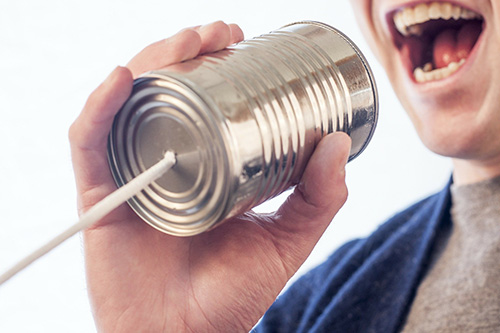Are you wondering if you talk too much? It can be especially difficult to realize you’re doing it while you’re rambling. You’ve got to stop and think about it.
And if you’re stopping to think about it, then you’re probably talking too much. Simple logic, right?
Maybe you have a lot to say? That’s awesome—let the world know!
However, there are norms regarding social skills. And normal doesn’t include being the blabbermouth who talks over everyone. Don’t be THAT person. You know, people that talk TOO much—often about nothing, who everyone knows BECAUSE of it.
That’s exactly what this article is about: not being THAT person, who talks too much.
Here are 7 obvious signs you talk too much, and how to stop doing it :
1. You are misunderstood frequently

We’ve all seen that face—that look of, “Did I really just hear, what I think I heard?”
Okay so, maybe you are one of those people who has a laissez-faire sense of humor, and so you say whatever comes to your mind; whenever it comes, because it suits the moment. It suits your own humor, and you get fulfillment from it.
This type of personality flirts on the border of respect, and a lack thereof, due to high individualism. A person like this is often excessive, and they can be frequently misunderstood.
What is excessive high individualism? And what’s it have to do with people that talk too much?
It’s when a person has so much character, that their desire to continue fulfilling this character outweighs the repercussions of what could happen by doing so.
You could try telling this person to relax a bit with the fluff, but their reply would likely be, “talk to the hand.”

It’s certainly OK to have character. But, if you find that people often look at you like they don’t understand you, it could be time to reflect on the fact that, maybe, you talk a lot.
Stop. Analyze the situation. Determine if your individualism is causing you to talk too much.
Often times, when people blabber, they’re also talking too fast. So the quantity and speed of words coming from someone’s mouth are like opposite points on an increasing bell curve.
Talking too fast is a sign that you’ve got a lot to say. And you’ve got a lot to say, because likely, you’re a chatterbox and it’s being ignited by your social interactions.
If you can get in the habit of using fewer words while talking, it may give you subject durability. This is your ability to stay on topic while delivering your viewpoints, all while preserving the topic and without your delivery being misinterpreted.
What’s the takeaway?
If you’re frequently being misunderstood when you talk, it could be a sign that you talk too much. Try slowing down and getting to your point without chattering.
2. People stare right through you

Have you ever been talking with someone, but it was really just a one-way conversation?
You were talking to them, but they literally stared right through your soul? They probably weren’t listening to a thing you said. This also means they likely hadn’t said a word during this conversation. So, what does THAT mean?
It means by the laws of nature, you were talking too much.
Because if you were to simply stop talking, they would have realized you stopped, and it would have pulled them back into reality.
However, the cause of their staring off into space could be other things, too.
- The person’s mind is easily inspired — Something you said opened up a a whole new world of ideas for them, and now they can’t let it go.
- Autism spectrum / Asperger’s Syndrome — The person staring off is actually hyper focusing on something you said. And they don’t know how to give social ques that they are listening to you.
- A wandering mind — The person’s mind drifts from subject to subject, and your excessive chatter only makes their drifting worse.
In other words, they might be staring off while you talk not because you’re talking too much, but because they have trouble organizing their thoughts in social interactions.

However, there’s a catch.
YOU might also have trouble organizing your thoughts socially, which could be causing you to talk too much.
What I’m getting at, is that there may be a correlation between people that talk too much and a lack of organization.
Check out a recent article I published about being organized. It’s a complete guide on how to be organized, and I think it may be worth your time.
Becoming more organized may help you balance your ability to gather your thoughts, and reduce your frequent chitter chatter.
What’s the takeaway?
If you notice people staring through you with that blank, colorless look in their face while you’re talking, then you might be one of those people who talk too much. It may help you to try using techniques of organization to develop better ways of expressing your thoughts.
3. Boredom in conversation
Let’s now pretend that it’s the other person talking too much, and you’re on standby.
There is nothing more stimulating than ridding of bad energy by engaging in a full-fledged conversation, where everyone is contributing equally. On the flip side, there’s nothing worse than talking with someone who is enjoying the conversation WAY more than you are.
Not only is the other person likely expressing truer emotions due to them not holding back, but they are probably talking A LOT more than you.
In fact, you’re likely only nodding your head and giving short 2-5 word responses.
These short replies may also be anxiety symptoms of being asocial.
It can be hard to break away from a conversation like this. This is especially true if the other person is talking SO much that you don’t know how to disengage without coming off as rude, antsy, or uninterested.

How To End a conversation you don’t want to be in
There’s an awesome article by Scienceofpeople about disengaging from conversation that I read recently. Here are my top three picks:
- Bringing up their main point — This is where you become excited about the topic, and use that excitement to your advantage, so you can escape.
“Wow, I can’t believe you thought of that! How genius. I’m going to have to keep that in mind when I write my article. Let me get to it now, before I forget!”
- Being considerate and honest — You end the conversation by informing them politely, that you’ve got other stuff to do.
“Well, it was good chatting with you. I’ve got to get going now. I have a busy day a head of me. Cheers!”
- Acting like your presence is an intrusion — This is where you pretend as if you are bothering them, and taking them away from what they were doing.
“It’s been nice catching up with you. I don’t want to hold you up with what you’ve got going on. We’ll pick up this conversation another time!”
Your best bet to disengage is to take reign of the conversation and act busy, even if you’re not. This way, your exit isn’t about you being bored, it’s about you having something else to do.
What’s the takeaway?
If you find that when conversing with others, they are who is interested in keeping the conversation alive, it could be a sign they’re talking too much.
You then have three options:
- Try to match their excitement in the conversation.
- Find a different topic that suits your interests.
- End the conversation and walk away.
All in all, whether it’s you or someone else who is talking too much, you’ve got to learn how to deal with it. You need to be able to analyze your environment and react. It’s one of the best ways of getting people to like you.
4. Nobody shares your opinion

Have you ever been frustrated because it seems no matter which topic you discuss with someone, they never see eye-to-eye with you?
Perhaps you feel like you’re from some other planet, and that your parents were hiding it from you all this time? As cool as that seems, it’s probably not true. Unless?
However, what could be possible, is that you live in a completely different world—inside your head. And so, naturally, you ramble as an attempt to describe its attributes clearly to other people.
But as clear as you are—still, no one agrees with what you see.
They disagree because you aren’t forming your opinions based on real-life qualities. You are making subjective assumptions based strictly on how you see life, while limiting influence from anyone who may persuade you differently.
This is also a symptom of having high individualism.
The thing is, you aren’t ever going to explain the story that’s happening in your head well enough for the world to truly follow along. That is, of course, unless you jot it down—every single detail, writing using every sense.
Even then, a good writer should only provide enough information for the audience to see the picture, all while leaving out enough detail so the audience can use their imagination.
What’s the takeaway?
If you often find that your party enters the silence zone when you describe the way you see the world, it could be a sign you talk too much.
Just because people see what you’re seeing—feel what you’re feeling—does not mean they agree. You can’t force your opinions on others. Try talking a bit less and hear what others have to say.
5. Other people’s Mannerisms change when you talk

Taps foot! Taps foot! Sighs! Pats hand on side of leg!
If you’ve got people in your conversation doing this, there’s a problem. They are either extremely anxious, asocial, or it’s because you talk WAY too much.
Try doing these things to see if YOU are triggering their compulsions:
- Use fewer words. If they stop tapping, it’s because you’re talking too much.
- Let them do the talking.
- Lighten the mood by laughing it out.
- Change the subject. Maybe they aren’t interested.
- Ask them a question about something you said, to see if they were paying attention.
It’s important that you get into the habit of observing peoples’ body language, mannerisms, and behaviors.
Doing so will help you become more aware of your place amidst the discussion. And it will provide you with social cues, like if you should change the pace or direction of the conversation.
What’s the takeaway?
If you are talking with a group of people and notice one or more of them has compulsive behaviors, such as tapping, twitching, or fidgeting, you may be their trigger.
It could be that you’re talking too fast, too soft, or too loud. And it can also be that what you’re saying is irrelevant or boring, or that you simply talk too much.
6. You can’t get along with Others

If you find that you fit the criteria for everything we’ve discussed so far, I want you to do some deeper introspecting, because you’re considered high risk of talking too much.
Consider these two questions:
- Do you have trouble getting along with people?
- Are you more of an introvert, or extrovert?
I used to be very introverted, but I taught myself how to be extroverted on demand. I learned how to do that as a barber, which ended up being the wrong career for me. But hey, I believe everything happens for a reason. This world is a life long learning experience.
What are you? Introverted or extroverted? Let me know in the comments section below!
Personality types of people that talk too much
Although there isn’t a big correlation between introversion and people who talk a lot, it could still happen. Do you know why?
Because silence kills.
Not literally, but figuratively. When an introvert is in a group of people (i.e. a laissez-faire manager), it can be really hard for them to open up and give proper direction. So much so, that their silence can become painful to bear.
If we were to compare personalities to angles (because we all love math, right!?), an introvert is like a 45° angle, where an extrovert is a 90° angle. In very small groups of familiar people, an introvert can become an extrovert. And the extrovert, well, stays an extrovert.
The issue arises when the introvert opens up TOO much—like a rebound-effect from fear of rejection, and becomes obtuse, blowing past all social barriers.
People who are obtuse can be hard to get along with.
Obtusers (totally made-up word, but it fits) can be overwhelming to others, and can even cause people to shut down in their presence. They are loud, often obnoxious, talk too much, and say what’s on their mind.
What’s the takeaway?
If you notice that you tend to have moments of spontaneously opening up to people, it could be that you’re an introverted obtuser. You may try to hide this from people, but the result ends up being that you talk too much.
Want some words of encouragement? Even though you believe other people may always be judging you in social interactions, they’re probably not. Try ridding of the mindset that all eyes are on you.
This in itself, may help you open up in a healthy way so that people don’t know you as someone who talks a lot.
7. You become aware of the issue

If you are aware that you may be talking too much, then it’s likely true.
In other words, if you feel like you are the only one talking—in a dead-end conversation—then it’s probably because you fit at least one of the criteria in this guide.
Where’s the logic in this?
Well, if you barely talk, then you wouldn’t feel like you’re over talking. The same goes for anything. If you don’t use a computer, then you won’t ever feel like you use a computer too much.
So, if you have a feeling that you’re a talker, or you’ve got a friend who’s a blabbermouth but doesn’t know it, my best advice is to read this article a few times over.
What’s the takeaway?
Always follow your intuition. If your gut tells you that you talk too much to the point where you feel inclined to research it, then your gut is probably correct.
One of the many benefits of reading is to expand on new ways of personal development. And so I congratulate you on taking this big step to understanding yourself better and to improve your mindset.
Conclusion
There are many variables you can look at to determine if you talk too much. Consider it one of your smart goals in life to recognize when you’re doing it, and stop.
When you set your new years resolutions every year, you should always test new ways to improve your social interactions. Using fewer words will lead people to trust more what you have to say, and it instills greater meaning into every word that leaves your mouth.
And that’s all we want in life, right? To have meaning; meaning that lasts.
I’ll leave you with that, friends. Until next time.
Here’s a quick recap of 7 Obvious signs you talk too much, and how to stop:
- You are misunderstood frequently.
- People stare through you.
- Bored in conversation.
- Nobody shares your opinion.
- Other people’s mannerisms change when you talk.
- You can’t get along with others.
- You become aware of the issue.
That’s all folks! Thanks for reading.
Feel free to comment below if you liked this article on 7 obvious signs you talk too much, and how to stop doing it. I’d love to take questions or suggestions on other content you’d like to see on eHowdy!

This is totally me. I find that joking about my over-blabbing when I am in meetings helps to lighten the mood when I start to see peoples’ eyes glaze over. And it gives me a chance to stop myself from rambling, collect my thoughts and organize them, and then start again more efficiently.
That’s a great tactic! Thanks for sharing 😊